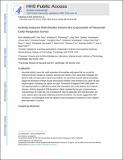Activity-Induced DNA Breaks Govern the Expression of Neuronal Early-Response Genes
Author(s)
Madabhushi, Ram; Pfenning, Andreas R.; Gao, Fan; Pan, Ling; Yamakawa, Satoko; Seo, Jinsoo; Rueda IV, Richard; Phan, Trongha; Yamakawa, Hidekuni; Pao, Ping-Chieh; Stott, Ryan T; Gjoneska, Elizabeta; Nott, Alexander; Cho, Sukhee; Kellis, Manolis; Tsai, Li-Huei; ... Show more Show less
DownloadKellis_Activity-induced dna.pdf (2.961Mb)
PUBLISHER_CC
Publisher with Creative Commons License
Creative Commons Attribution
Terms of use
Metadata
Show full item recordAbstract
Neuronal activity causes the rapid expression of immediate early genes that are crucial for experience-driven changes to synapses, learning, and memory. Here, using both molecular and genome-wide next-generation sequencing methods, we report that neuronal activity stimulation triggers the formation of DNA double strand breaks (DSBs) in the promoters of a subset of early-response genes, including Fos, Npas4, and Egr1. Generation of targeted DNA DSBs within Fos and Npas4 promoters is sufficient to induce their expression even in the absence of an external stimulus. Activity-dependent DSB formation is likely mediated by the type II topoisomerase, Topoisomerase IIβ (Topo IIβ), and knockdown of Topo IIβ attenuates both DSB formation and early-response gene expression following neuronal stimulation. Our results suggest that DSB formation is a physiological event that rapidly resolves topological constraints to early-response gene expression in neurons.
Date issued
2015-06Department
Broad Institute of MIT and Harvard; Massachusetts Institute of Technology. Computer Science and Artificial Intelligence Laboratory; Picower Institute for Learning and MemoryJournal
Cell
Publisher
Elsevier
Citation
Madabhushi, Ram et al. “Activity-Induced DNA Breaks Govern the Expression of Neuronal Early-Response Genes.” Cell 161, 7 (June 2015): 1592–1605 © 2015 Elsevier Inc
Version: Author's final manuscript
ISSN
0092-8674
1097-4172